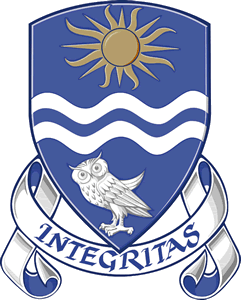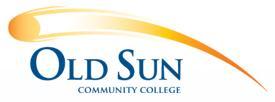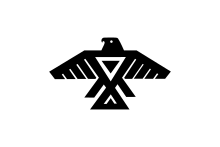
Nipissing University is a public university located in North Bay, Ontario, Canada. The campus overlooks Lake Nipissing.

Algonquin College of Applied Arts and Technology is a publicly funded English-language college located in Ottawa, Ontario, Canada. The college has three campuses, all in Ontario: a primary campus located in Ottawa, and secondary campuses located in Perth and Pembroke. It offers bachelor's degrees, diplomas, and certificates in a range of disciplines and specialties. The college serves the National Capital Region and the outlying areas of Eastern Ontario, Western Quebec, and Upstate New York. It has been ranked among the Top 50 Research Colleges in Canada and has been recognized as one of Canada's top innovation leaders. The enabling legislation is the Ministry of Training, Colleges and Universities Act. It is a member of Polytechnics Canada.

University College of the North (UCN)—formerly Keewatin Community College—is a post-secondary institution located in Northern Manitoba, Canada, with two main campuses in The Pas and Thompson, respectively. UCN has a student body of approximately 2,400 annually and a staff of approximately 400.
Georgian College is a College of Applied Arts and Technology in Ontario, Canada, partnered with ILAC International College. It has 13,000 full-time students, including 4,500 international students from 85 countries, across seven campuses, the largest being in Barrie.

St. Lawrence College (SLC) is a College of Applied Arts and Technology with three campuses in Eastern Ontario, namely Brockville (1970), Cornwall (1968) and Kingston. It is affiliated with private Alpha College of Business & Technology in Toronto and Canadian College in Vancouver. As of May, 2024, St. Lawrence College is no longer accepting new admissions to programs offered at their partner colleges. The population of St Lawrence College and it's affiliates includes a large contingent of international students. The college processed 5,421 international study permits in 2023.
Aurora College, formerly Arctic College, is a college located in the Northwest Territories, Canada with campuses in Inuvik, Fort Smith and Yellowknife. They have learning centres in 23 communities in the NWT. The head office for Aurora College is located in Fort Smith.
Olds College of Agriculture & Technology is an Alberta public post-secondary institution located in Olds, Alberta, established in 1913 as Olds Agricultural College.
The Anishinabek Nation, also known as the Union of Ontario Indians, is a First Nations political organization representing 39 member Anishinabek Nation First Nations in Canada in the province of Ontario, Canada. The organization's roots predate European contact in the 16th century, in the Council of Three Fires. The Union of Ontario Indians was incorporated in 1949 to serve as a political advocate and secretariat for the Anishinabek First Nations. The Anishinabek peoples speak Anishinaabemowin and Lunaape within the Anishinabek Nation territory in Ontario. In 2017, the Council changed its identification using the name "Union of Ontario Indians" only for legally-binding agreements but for all other purposes referred to themselves as Anishinabek Nation. The head office for the Union of Ontario Indians is located at Nipissing First Nation near North Bay, Ontario.

Bow Valley College is a Canadian public, board-governed college located in Calgary, Alberta, operating as a comprehensive community institution under the Post-Secondary Learning Act of Alberta. The branch campuses are: Airdrie, Banff, Cochrane, Okotoks, and Strathmore. Bow Valley College is a member of the Alberta Rural Development Network and Colleges and Institutes Canada.

Northwestern Polytechnic (NWP), previously known as Grande Prairie Regional College (GPRC) is a publicly funded educational institution located in northwestern Alberta, Canada.

FNTI is an Indigenous-owned and -governed post-secondary institute located in Tyendinaga Mohawk Territory in Ontario. The institute puts on programming rooted in Indigegogy and Indigenous ways of knowing.

Higher education in Canada includes provincial, territorial, Indigenous and military higher education systems. The ideal objective of Canadian higher education is to offer every Canadian the opportunity to acquire the skills and knowledge necessary to realize their utmost potential. It aspires to cultivate a world-class workforce, enhance the employment rate of Canadians, and safeguard Canada's enduring prosperity. Higher education programs are intricately designed with the perspective of the learner in focus, striving to mitigate risks and assure definite outcomes.
Suncrest College is a post-secondary educational institution in Saskatchewan, Canada, formed from a merge of Parkland College and Cumberland College on 1st June 2023.

The Biinjitiwaabik Zaaging Anishinaabek is an Ojibway First Nation band government in Northwestern Ontario, Canada. Their territory is located on the Rocky Bay 1 reserve in Greenstone, Ontario, bordering on the community of Macdiarmid. In October 2008, they had a total registered population of 678 people, of which 327 people lived on their own Indian reserve. The Nation is led by Chief Gladys Thompson. The council is a member of Nokiiwin Tribal Council, a Regional Chiefs' Council, and is member of Union of Ontario Indians, a Tribal Political Organization. The First Nation is also a member of Waaskiinaysay Ziibi Inc., an economic development corporation made up of five Lake Nipigon First Nations.

Yellowhead Tribal College is an educational institution located in Edmonton, Alberta, Canada, which is run by four member nations of Treaty 6 with the four members being Alexander First Nation, O'Chiese First Nation, Sunchild First Nation and Alexis Nakota Sioux Nation.

Old Sun Community College is a community college owned and operated by First Nations that provides post-secondary education and training in Siksika 146, Alberta, Canada, to members of the Siksika Nation.

Maskwacis Cultural College (MCC) is a private post-secondary institution within the Four Nations of Maskwacis, Alberta, Canada. MCC offers programs from basic adult literacy, two-year college diplomas, to university transfer programs.

Six Nations Polytechnic (SNP) is a Haudenosaunee-governed Indigenous institute on Six Nations of the Grand River First Nation. SNP is an Indigenous Institute, the third pillar of post-secondary education in Ontario, as recognized by the Indigenous Institutes Act of 2017, The Six Nations of the Grand River First Nation are the Mohawk, Cayuga, Onondaga, Oneida, Seneca, and Tuscarora. The Six Nations of the Grand River First Nation reserve acreage at present covers some 46,000 acres (190 km2) near the city of Brantford, Ontario. Six Nations Polytechnic has two campuses, one located in Ohsweken and one located in Brantford.

Seven Generations Education Institute is an Aboriginal-owned and controlled post-secondary institution, co-founded by the ten bands in the Rainy Lake Tribal area in 1985. The ten bands are: Big Grassy, Big Island, Couchiching, Lac La Croix, Naicatchewenin, Nigigoonsiminikaaning, Ojibways of Onigaming, Rainy River, Seine River and Mitaanjigamiing. Each of the bands appointed one member to the board of directors of Seven Generations Education Institute, which functions with the leadership of the Executive Director.
Kenjgewin Teg is an Indigenous-owned and controlled post-secondary institution at M'Chigeeng First Nation, on Mnidoo Mnising Manitoulin Island, Ontario, Canada. In the Ojibwe language, Kenjgewin Teg means a place of knowledge.
















